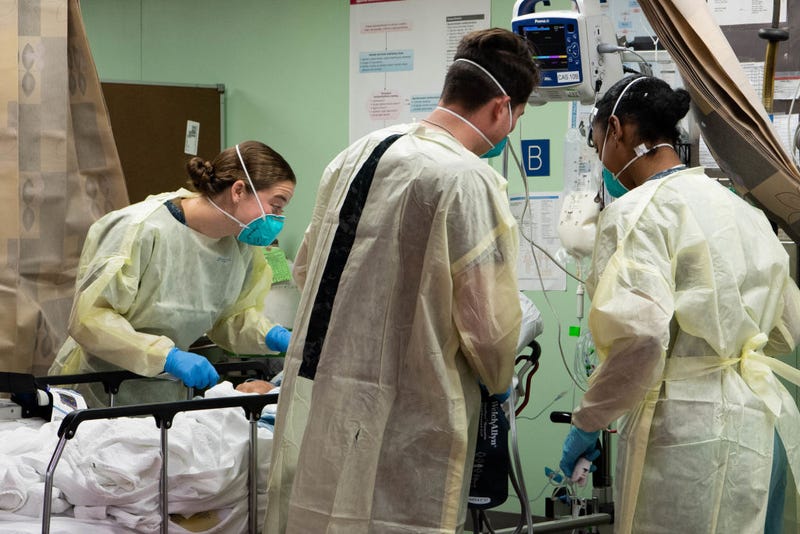
JEFFERSON CITY, Mo. (KMOX/AP) – Governor Mike Parson announced Wednesday afternoon a plan to spend federal CARES Act money to bring in private healthcare professionals to supplement hospitals around the state.
Facilities have been nearing capacity, but the Governor says, “This will add nearly 600 total beds to our statewide capacity, including some critical care beds.”
He says the funds will go to a nationwide healthcare company, Viziant, to bring in about 760 doctors, nurses and respiratory therapists to ease the ongoing shortages.
The contract with Viziant is for 12 weeks, with the State paying through the end of December and hospitals picking up the tab after that.
The announcement did not indicate how much the contract is for, nor how much the state is spending. The current special session of the legislature is looking to spend $1.2-Billion in federal money allocated to Missouri.
The workers will include registered nurses, respiratory therapists and certified nurse assistants. When fully deployed, the plan will add nearly 600 hospital beds to Missouri’s statewide bed capacity, Parson said.
As of Wednesday, Missouri recorded a daily average of 2,827 new cases of COVID-19 over the past seven days, raising its total since the pandemic started to 305,370 confirmed cases. As of Sunday — the latest data available — the state reported that 2,651 people were hospitalized in Missouri with COVID-19 and that only 27% of the state’s inpatient hospital beds were unoccupied.
“Staffing is one of the biggest challenges facing our hospitals right now,” Parson said. “The issue is not so much about physical beds or space. We have plenty of hospital beds available. The issue is that there aren’t enough doctors and nurses to staff these beds.”
Details of where the workers will come from and the cost of the program were not yet available.
Dr. Randall Williams, director of the Missouri Department of Health and Senior Services, said the state should receive 51,000 doses of Pfizer’s vaccine soon after a Dec. 10 meeting of a U.S. Food and Drug Administration vaccine advisory committee. Doses of a vaccine from Moderna are expected the week of Dec. 21, if emergency authorization is approved, The St. Louis Post-Dispatch reported. Department spokeswoman Lisa Cox said Wednesday that roughly 105,000 doses of that vaccine are expected.
The state has chosen 10 sites around the state that could vaccinate about 35,000 health care workers and long-term care facility staff first, followed by residents of long-term care facilities, Williams said.
Those vaccinations are expected to be completed by the end of January. About 3 million “critical infrastructure” workers, such as first responders, teachers and workers at food manufacturing plants should be vaccinated by February, and the state expects to have the vaccine available to the general public by mid-April or early May, he said.
Even as cases surge, some health officials in Kansas City and St. Louis County are getting pushback after closing some bars and restaurants in recent days for violating coronavirus restrictions.
A Kansas City bar owner is asking a Jackson County court to issue a temporary restraining order to overturn a 10 p.m. curfew on bars and restaurants, which the city and Jackson County imposed two weeks ago as part of a series of restrictions to slow the spread of the virus. The bar is asking to be allowed to stay open until 3 a.m.
St. Louis County health inspectors on Tuesday shut down four businesses that they said violated a ban on indoor service at restaurants and bars. Kansas City health inspectors closed five businesses over Thanksgiving weekend — four for violating a 10 p.m. curfew and one for hosting a large gathering.
Opponents of the restrictions contend public officials, such as Kansas City Mayor Quinton Lucas and St. Louis County Executive Sam Page, should not have unilateral authority to close or restrict businesses.
Lucas noted in a statement Tuesday that 4,000 Missourians have died from COVID-19, including more than 1,000 in the Kansas City area.
“We stand by our responsible steps to keep people safe,” Lucas said. “Missouri courts have held consistently that our communities have the right to protect public health. We will continue to do so.”


